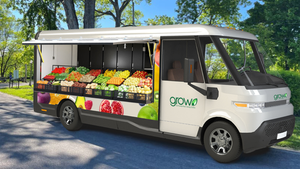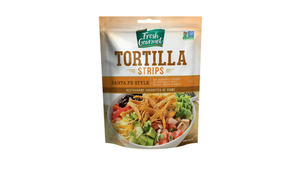Retailers See Fewer Opportunities for Forward Buys
With food-cost inflation up about 4% to 5% this year, retailers and wholesalers said they are passing along price increases to customers to varying degrees, based in part on how competitive the market is. And although some wholesalers said they are able to use forward buying of product to reduce their cost of goods when they are aware of pending price increases, many retailers said such tactics are
October 10, 2011
SN STAFF
With food-cost inflation up about 4% to 5% this year, retailers and wholesalers said they are passing along price increases to customers to varying degrees, based in part on how competitive the market is.
And although some wholesalers said they are able to use forward buying of product to reduce their cost of goods when they are aware of pending price increases, many retailers said such tactics are increasingly difficult to execute.
Bryan Roberts, director of nonperishables at Chandler, Ariz.-based Bashas', said the company has engaged in some forward buying, “but the manufacturers have set limits because they're not producing the quantities they used to produce, so they give us a set amount of advance inventory we can purchase.”
Bashas' has done forward buys on oil, sugar, butter and coffee, said Robert Ortiz, vice president of marketing and merchandising at the chain. This has helped Bashas' remain competitive and maintain its margins until its can raise retail prices.
Roberts said Bashas' hasn't found other ways to work with suppliers to counter cost increases.
“Sometimes we can negotiate a bit, but supplier increases are a matter of fact and there's not much there to negotiate,” he said.
Overall, Bashas' has not seen a lot of inflation in retail pricing in Arizona, they said, despite cost increases since last February and March.
“The market here has not reacted as fast as most others on raising retails,” Roberts said. “Although the cost of goods has gone up, it remains so competitive here that everyone is holding down prices as long as they can.
“We've seen some creep in the last couple of months on items where we had been holding down the price, including coffee and oil. And milk costs have gone up in the last month, but only on a regular-price basis.”
According to Ortiz, “Arizona probably has the lowest prices in the U.S. on a gallon of milk, which sells on ad for $1.57 to $1.79, compared with a regular retail of $2.69. But we've seen the cost of milk go up 10 cents to 15 cents a gallon in the last month or so.
“With the market making it so hard to raise prices, we've worked hard to get a better margin mix through cross-merchandising and including perimeter departments more than in the past to get the balance we need while holding prices on key items at market levels.”
Associated Food Stores, Salt Lake City, is coping with price increases by passing along as many as it can, Neal Berube, executive vice president and president of Associated Fresh Markets, told SN. (Berube is slated to become president and chief executive officer of Associated on Nov. 11.)
“In some categories like meat and dairy we are passing the increases through,” he said, “but it's much tougher on Center Store merchandise, where pricing is extremely competitive. We monitor the competition very closely, and we're able to pass on about half and unable to pass on about half.”
But consumers are aware of why the increases are coming, he added, noting, “The media have done a good job telling consumers that inflation is being passed forward.”
Associated has done more forward buying in the last five or six months, he said, “but it's been kind of a wash because others are doing the same thing. But at least we're able to keep our prices competitive, and we're also able to pick up a little margin.”
Forward buys have been mostly in commodities, including canned vegetables, sugar and flour, Berube said.
Another way Associated has tried to counter the impact of cost increases has been to take as many costs out of the system as possible, Berube said.
“We've done that by centralizing some programs to make it a one-stop process at our corporate stores, and we're also complying with promotions precisely to increase case movement. In addition, we are committing to products in advance so suppliers can plan their production accordingly,” he explained.
John DeJesus, president of Chelsea, Mass.-based Foodmaster, said changes in the way retailers and manufacturers do business has resulted in fewer opportunities to do forward buys and other tactics that traditionally helped retailers when prices were rising. The evolution, he said, has been toward a more impersonal relationship and in some cases, suppliers under pressure to reduce their own costs and reduce unprofitable sales.
“It's been awhile since we've had inflation where whatever you have today is valued more in two weeks,” DeJesus said. “We used to be able to take a [forward buying] position but manufacturers are getting smart now and saying no. Everyone wants to do the turn business. If you sell everything on sale, no one will make any money, and if the manufacturer sells everything on deal, he won't make any money.
“When prices were too high, you used to be able to play the demand-and-supply game: We lay off it for a while and sooner or later [suppliers] will get heavy with it and the price will come down,” he added. “Today you can't do that. What you're hearing about farmers now is that they're decreasing the herds and saying, ‘Why spend the money to have all this cattle around?’ It'll cost them less to take care of them [if they reduce the herds], and the market keeps going up.
“Nobody wants to let you forward buy anymore. Even manufacturers tell you, ‘We're going up next week, and there's no way to buy in.’ Nowadays, you have as much problems with people just honoring the price they quoted to you. If the market is going up, they will just sell to someone else.”
Al Plamann, CEO of Unified Grocers, the Los Angeles-based member-owned cooperative, said his company is doing forward buying, as it always has, “but it's always dependent on the vendor community.”
“To the extent in the last year that some vendors have announced prices increases as short as four weeks out while others were six months out, we find ways to take advantage of that.
“The price trend has been up, and while we pass through some increases to our members, we delay others — primarily increases on high-volume, very competitive categories.”
Tom Jamieson, who operates 10 Shop ‘n Save and 10 Save-A-Lot stores in the Pittsburgh area, said vendors seem more and more interested in encouraging multiple purchases using loyalty cards as a way to offset price increases.
“We've seen a lot of vendors using loyalty-marketing data to get the discount down,” he said. “In that case, whatever the consumer buys is what you get the credit on from the vendor.”
Vendors are promoting a lot of “overlays” through loyalty marketing, he explained, in which they offer a free item in exchange for buying a certain amount of items at the regular price.
“That been a big thing is this market for about a year and a half,” he said.
He said he is able to participate in some forward buying, although as a retailer his opportunities are limited due to storage constraints.
Rising prices at the stores have been met with a consumer migration toward lower-cost items, said Dennis Butler, president of Laurel Grocery Co., London, Ky. The distributor as a result is rolling out a marketing program to promote everyday low prices on private-label items with shelf tags and store signage, and is also looking for additional lower-priced items to offer to its customers, Butler added.
The wholesaler is teaming up with Auburn, Mass.-based Imperial Distributing for general merchandise and HBC, he said, to gain access to some low-cost merchandise.
“Some of things they have are seasonal and promotional items at low cost, and a lot of dollar-type merchandise, and we're going to see if we can drive general merchandise sales that way,” Butler said.
“There is a lot of pressure on low-price items now,” he added. “We have to look to find alternatives to higher-priced branded items. We are very, very open to adding low-priced, quality merchandise.”
Butler said manufacturers today are less prone to offer opportunities for forward buying. Laurel instead is focused on revamping a program known as the strategic marketing initiative, which allows participating retailers to develop an EDLP program in Center Store. That effort should be set to roll out early next year, he said.
Joseph Zahriyeh, owner of Fresh n' Save Marketplace, New York, said commodity prices have been going up, and vendors have been passing the increases along to retailers.
“We have to pass [inflation] along, but for some items, we don't,” he said. “We may make only 10% profit, but we use [price] to bring the customers in. Some items we can't raise, and the customers understand that. You can't go too high in a recession, even if it affects your profits.”
In a recent report, Deborah Weinswig, an analyst with Citigroup, New York, described Kroger Co.'s strategy for passing along cost increases.
“Kroger continues to pass along cost increases to its customers,” she said. “Interestingly, management stated that Kroger has passed through nearly every penny of cost increases in order to keep CPG companies in check. We believe this sends the message that Kroger will not respond favorably to continued cost increases from CPGs, which forces these companies to be faced with less units sold.”
In the Cincinnati-based retailer's second-quarter earnings conference call, Kroger said product-cost inflation excluding fuel was up about 5.2% for the quarter. It projects overall cost inflation of 3% to 4% for the year.
Weinswig said that during a visit to Kroger's headquarters, the company noted that “some inflation is good for the business, but this becomes more difficult to manage against a backdrop of weakened consumer spending.”
She said she believes Kroger could face margin pressures if cost inflation continues to accelerate amid lingering consumer weakness.
Reporting by Mark Hamstra, Elliot Zwiebach and Jon Springer
You May Also Like




